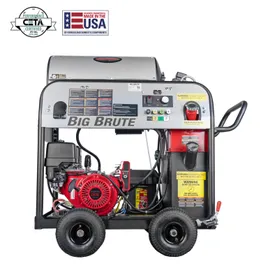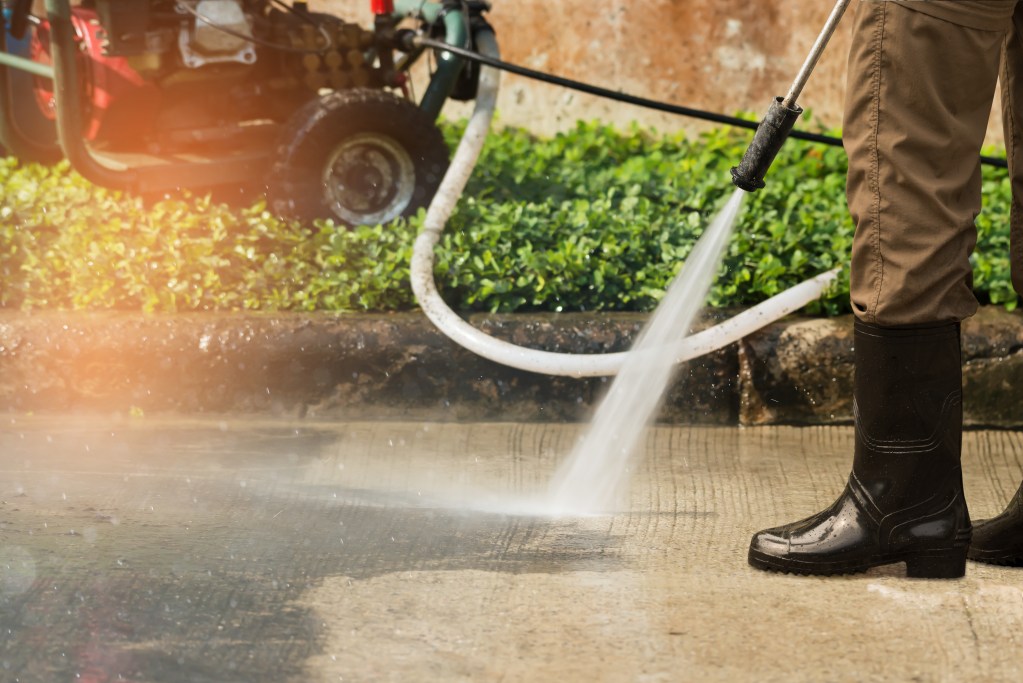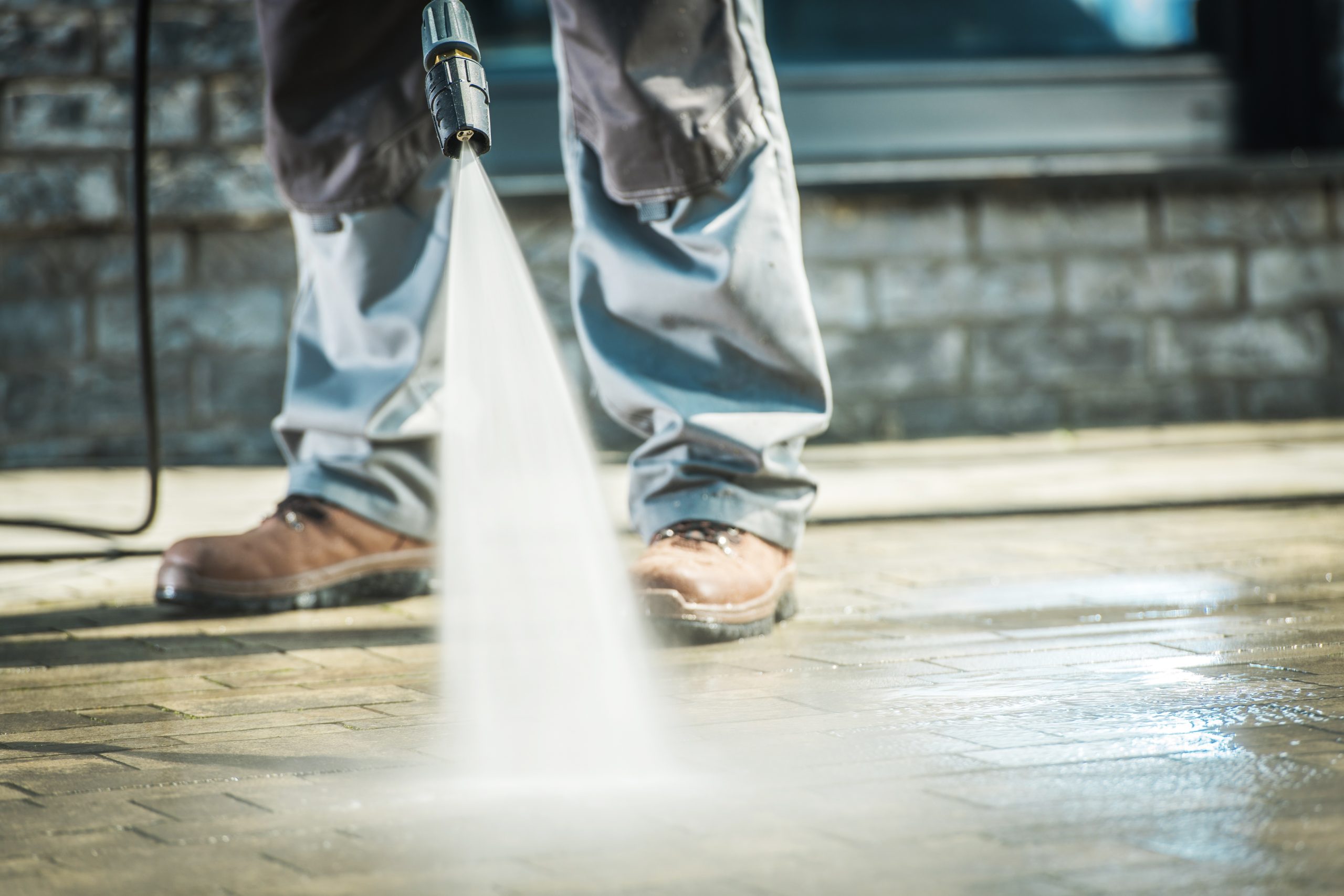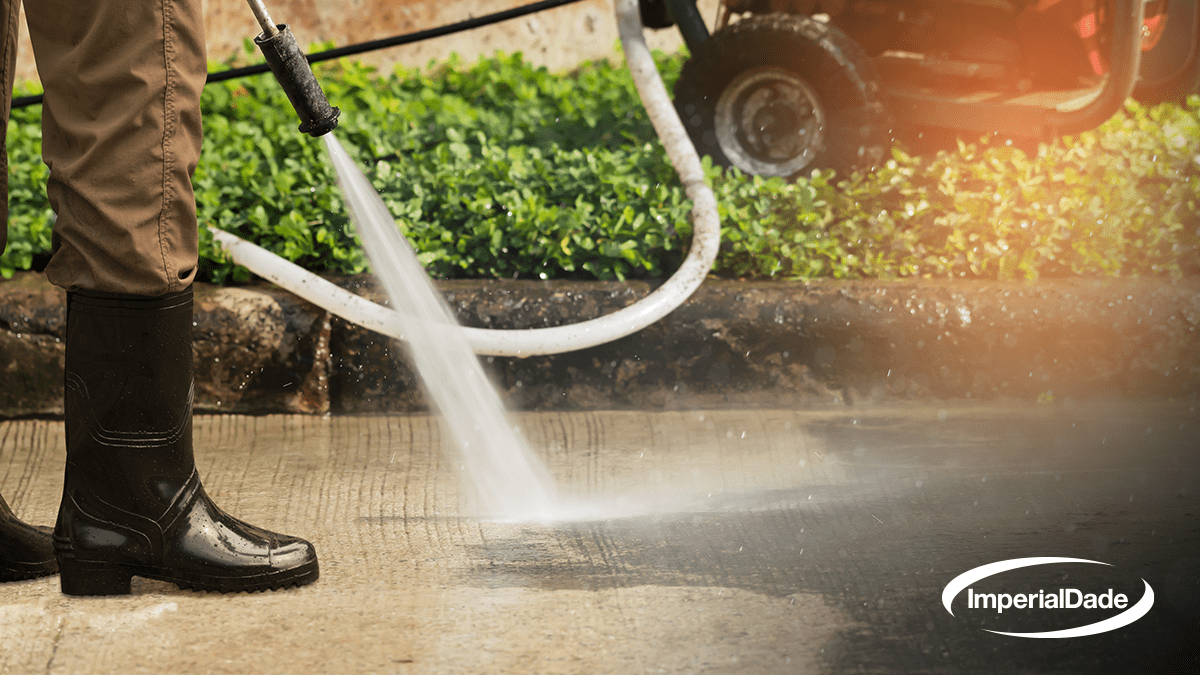Pressure washers have become a piece of indispensable equipment for effectively and efficiently cleaning surfaces in a variety of commercial settings.
Whether you’re tackling small, daily cleaning tasks or performing larger, periodic maintenance, understanding the ins and outs of a pressure washer is crucial for achieving the best results.
Or, maybe you’re on the fence about purchasing a pressure washer for your business and are looking for the right equipment to get the job done. Don’t worry! We will cover everything you need to know in this guide.
In this comprehensive guide, we’ll explore the key features of pressure washers, how they work, and other important considerations when choosing the right one for your facility.
What is a Pressure Washer?
A pressure washer is a machine that utilizes pressurized water to clean surfaces. The high-pressure stream of water is instrumental in removing dirt, grime, mold, and even peeling paint.
There are a lot of different cleaning tasks that a pressure washer can be used for, such as cleaning the exterior of a building, driveways and walkways, vehicles, fencing, concrete and masonry, roofs, and brick surfaces, to name a few.
How Does a Pressure Washer Work?
Pressure washers operate by pressurizing water through a pump powered by either an electric motor or gasoline engine. The power source along with the pump system are what determine the maximum power of the pressure washer.
The cleaning power of a pressure washer can be measured in pounds per square inch (PSI) and gallons per minute (GPM).
Think of PSI as a measure of power and GPM as a measure of water flow.
What Are the Different Types of Pressure Washers?
There are light-duty, heavy-duty, and commercial pressure washers, all with varying PSI and GPM capabilities.
What PSI Pressure Washer Do I Need?
When selecting a pressure washer, consider the PSI and GPM. Higher PSI and GPM result in faster, more powerful cleaning.
When considering PSI and GPM, pressure washers can be broken down into three types:
- Light-Duty Pressure Washers
- Heavy-Duty Pressure Washers
- Commercial Pressure Washers
Light-Duty Pressure Washers
Light-duty pressure washers are typically used for small cleaning tasks. That being said, they can be effective choice for performing most commercial cleaning tasks.
For example, if your facility’s front walk is dirty or muddy after a recent rainfall and you want to clean it off, a light-duty pressure washer is all you’ll need.
These models max out around 1900 PSI and up to 2 GPM.
Heavy-Duty Pressure Washers
Heavy-duty pressure washers are designed for commercial use, making them the right choice for demanding cleaning tasks and larger job sites.
For example, if you’re performing periodic maintenance on the outside of your facility and want to clean dirt and grime off the outer walls, a heavy-duty pressure washer is the way to go.
These models cap out at 2800 PSI and up to 3 GPM.
Commercial Pressure Washers
These pressure washers are far more powerful than light or heavy-duty models.
Commercial pressure washers are designed to tackle cleaning tasks with the highest degree of efficiency.
Take the last cleaning example we looked at, performing periodic maintenance on the outside of your facility; a commercial pressure washer will complete that task in half the time and with greater cleaning efficiency than the heavy-duty model.
These models max out at 7000 PSI and up to 5.5 GPM.
Pressure Washer Key Components
There are several components of a pressure washer that you’ll want to become familiar with before purchasing one for yourself.
These components are:
- Power Supply
- Pump System
- Boiler
- Hose
- Trigger Handle
- Spray Wand
- Nozzle
1. Power Supply
When it comes to the power supply there are two options: gasoline or electric.
Gasoline-Powered

Gasoline pressure washers are the go-to option for larger cleaning tasks and outside commercial use.
Their cord-free design allows for better mobility, making them ideal for expansive areas. Gasoline models are also capable of handling bigger, tougher jobs, like washing an expansive parking lot or the exterior surfaces of a large building.
The increased power does come with a trade-off though, as gasoline pressure washers require more maintenance and a readily available supply of gasoline. Additionally, they tend to be heavier and more expensive than electric models.
Electric-Powered
Electric pressure washers are popular choices for homeowners due to their affordability and ease of use.
They cost less, run quieter, and require less maintenance than their gasoline counterparts. The lightweight design makes them easy to maneuver, but the drawback is the dependence on a power cord, limiting portability.
Electric models are generally suited for light-duty tasks, such as cleaning outdoor furniture, the front walk, and vehicles. Heavy-duty electric models are more robust and suitable for demanding, commercial cleaning tasks.
2. Pump System
In a pressure washer, the pump system performs the essential task of drawing water from an external source and pressurizing it through the use of pistons or plungers.
The pump system’s role is to deliver a powerful, pressurized water stream to the nozzle. By doing so, pressure washers are able to effectively remove dirt, grime, and other debris from various surfaces.
3. Boiler
Some pressure washers are capable of using hot water for their cleaning tasks. In order to heat the water, a boiler is required. Most times, the boiler is a larger diesel-fired heating unit. Sometimes, however, there are electric pressure washers that are capable of using preheated water from the tap.
Note that both electric and gasoline-powered units can have a diesel-fired heating unit, and that the diesel is separate from the pressure washer’s main power supply.
4. Hose
The hose is designed for optimal flexibility and maneuverability. It’s what transports water that has gone through pressurization from the pump to the nozzle.
Hoses come in various lengths, typically ranging from 50 to 300 feet, offering increased reach in larger areas or increased control for tight spaces.
5. Trigger Handle
The trigger handle attaches to the hose and is compatible with different spray wands. Importantly, it serves as a safety feature, shutting off if dropped by the operator.
6. Spray Wand
Pressure washer wands tend to be designed differently depending on whether the pressure washer is electric or gasoline-powered.
Light-duty pressure washer wands are typically made of aluminum or a similar metal, and are suitable for general and light cleaning. Meanwhile, heavy-duty and commercial wands are usually constructed with higher-grade materials, like stainless steel, and are suitable for heavy-duty tasks.
7. Nozzle
The nozzle may just be the most important part of a pressure washer, determining both the spray pattern and the pressure.
Pressure washers can come with one nozzle or several different nozzles, each serving a specific purpose.
High-pressure nozzles are ideal for deep cleaning. The nozzles also vary in width, a narrow spray is for very direct cleaning, while a wide spray would be good for rinsing. So, both nozzles use the same pressure, but a wide nozzle spreads that pressure out over a larger area.
There are also specialty nozzles, like a low-pressure, soap-enabled nozzle that allows users to apply soapy water.
What Can You Pressure Wash?
It’s important to understand the capabilities and limitations of pressure washers on specific surfaces to ensure that you achieve optimal cleaning results without causing surface damage.

Of course, you should always follow the manufacturer’s recommended guidelines and pressure levels for different surfaces. This is best practice for maintaining the longevity of both the pressure washer and the surfaces you’re cleaning.
You can also refer to the following sections regarding whether you can or should pressure wash certain surface materials.
Can You Pressure Wash Concrete?
Pressure washing is highly effective on concrete surfaces. Whether it’s a driveway, sidewalk, or patio, a heavy-duty or commercial pressure washer can effortlessly remove built-up dirt, oil stains, and even mold or mildew.

Can You Pressure Wash Stucco?
Stucco can be pressure washed, but with caution. It’s crucial to use a pressure washer with a PSI no higher than 1500 if you want to prevent damage.
Can You Pressure Wash Brick?
Brick surfaces can be cleaned with a pressure washer, but you should pull back several inches to reduce the risk of damaging the grout between the bricks.

Can You Pressure Wash Asphalt?
Pressure washing asphalt can be okay, but there are stipulations. You should use a light-duty pressure washer for rinsing applications. Avoid heavy-duty and commercial pressure washers, as they may remove gravel from the asphalt, causing potential damage.
Can You Pressure Wash Wood?
Wooden surfaces can be pressure washed, but only with a light-duty pressure washer. Higher PSI levels can lead to damage, including stripping away paint or splintering the wood.
How Much Does a Pressure Washer Cost?
The cost of pressure washers varies based on their type and purpose.
High-pressure electric models can range from around a few thousand to several thousand dollars, while commercial gasoline models can exceed five thousand dollars. To give you an idea of how expensive pressure washers can get, remote-operated pressure washers with trailers and self-contained water tanks can exceed $20,000.
Can You Rent a Pressure Washer?
Yes!
Renting a commercial pressure washer is a cost-effective way of completing a short-term cleaning task. It’s much cheaper to rent for a few hours or days than buy one outright, particularly if it’s only used periodically. Renting costs typically range from tens of dollars to a couple of hundred.
Final Thoughts
Pressure washers are versatile tools that can make cleaning tasks much more manageable. Understanding the features, types, and appropriate applications will help you choose the right pressure washer for your needs.
If you’re interested in learning more about the utility and benefits of pressure washers, or want to seek expert guidance on choosing the ideal pressure washer for your facility, we encourage you to reach out to a nearby Imperial Dade facility.
Our dedicated janitorial equipment specialists are ready to offer a complimentary evaluation of your facility’s cleaning needs.
